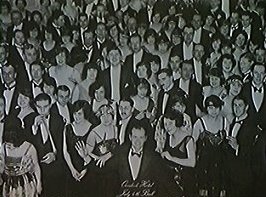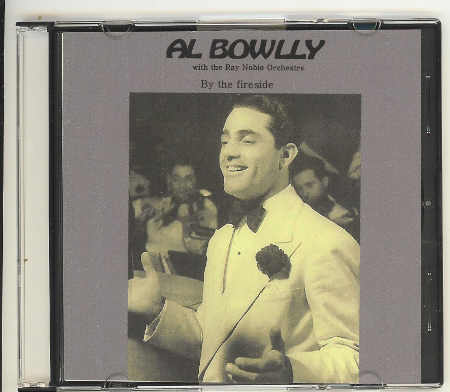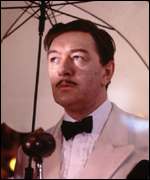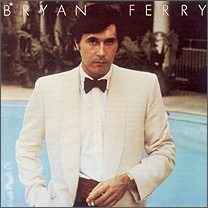It’s all Forgotten Now
Sun. July 25, 2004Categories: Abstract Dynamics

Ian Penman: Technology has made us all ghosts.
Fredric Jameson: The Jack Nicholson of The Shining is possessed neither by evil as such nor by the “devil” or some analogous occult force, but rather simply by History, by the American past as it has left its sedimented traces in the corridors and dismembered suites of this monumental rabbit warren, which oddly projects its empty formal after-image in the maze outside
Youve all heard at least on Al Bowlly song.
The one youre most likely to know is his version of Midnight, the Stars and You. revived, appropriately, given that this is a song for which the term haunting might have been coined, by Stanley Kubrick in his metageneric ghost story, The Shining in 1980.
Kubrick in fact utilized the song twice in The Shining; once in the Gold Room party scene, wherein a bewildered Jack Torrance, dressed in a Lumberjacket, stumbles confused amid the revellers in their twenties finery; and then, again, over the famous tracking shot which ends the film on a close-up of the photograph, dated July 1921, from which a tuxedo-wearing Torrance grins out.
Kubricks selection of music in The Shining is, as ever, exemplary. (I was somewhat surprised whilst reading cinema-sound theorist Michel Chions excellent Kubricks Cinematic Odyssey recently to note that, in an aside, Chion said that the choice of music in The Shining was poor.)
If The Shining is a film about the influence of the past on the present – or rather, about the simultaneity of past and present, about the non-chronic, non-sequential time which Deleuze and Guattari call Aeon – then Bowllys mottled recording was chillingly perfect. He already sounds like a ghost.
Bowlly actually made his most famous recordings a decade after the date of the Overlook party but a decade prior to the technological developments which would allow Frank Sinatras records to sound so intimately present. There was still, then, a palpable difference between the recording and the live performance, between presence (which the recording both occludes and preserves) and absence.* So while Sinatra still seems spookily present, uncannily contemporary, the audio equivalent of a sepia haze separates Bowlly from us. Even as you listen to them, his records sound like faded memories.
Like so many of Bowllys songs, Midnight, the Stars and You is itself about memories, about the attempt to hold onto the haecceity, the hic et nunc, the here and now, even as it is stolen by Times passage.

Kubrick used two Bowlly songs in The Shining. The second, Its All Forgotten Now, can be heard in the background as Jack speaks in the bathroom with Delbert Grady, the bland and obsequious clean-shaven manservantwhose toneless politeness projects such malevolence through its very inexpressivity (Jameson). The irony of the songs title in this context need hardly be stressed: here is Grady, a man who has murdered his family and then killed himself but who has no recollection of this at all (like the father in that dream talked of by Freud and Lacan who, grotesquely, does not know that he is dead). And here is Jack, who, we are informed, has always been the caretaker of the hotel but who, similarly, cannot remember being at the Overlook before.

Apart from The Shining, the other context in which you might have encountered Bowlly is of course in Dennis Potters The Singing Detective and Pennies from Heaven. For Potter, as for Kubrick, Bowllys lovely, honeyed croon becomes synonymous with a past that is, paradoxically, forever lost and forever insistent. In other words, Bowlly gives voice to the psychoanalytic past, whose relics, as Freud says, are preserved by being buried.

Kubricks selection of Bowllys tunes was no doubt inspired by their Englishness and therefore with their association with the past. Yet its worth noting that, although Bowlly made his name in London, he was actually born in South Africa. Its also misleading to atrribute these recordings to Bowlly, since Bowlly, as was par for the course in the thirties, was not so much the main focus of the band as the featured soloist. Most of his major recordings were attributed to the Ray Noble Band, and both Noble and Bowlly – too big for London – would ultimately head over to America, where the success of their records had already created an audience for them.
Nevertheless, Bowlly provided the template for a discreetly elegant English pop, a template discarded and all but completely forgotten once rock n roll ripped everything up. Ive written before of my resistance to the claim that pop is essentially adolescent. Yes, Bowllys songs are about romance, but it would be to fall into the most crassly reductive cod-Freudianism to assume that romance must always equal sexuality as processed through rock and rolls unsubtle amplifiers. Bowlly sings from a time before romance was monopolized by the consumer-culture machined desire of the yet-to-be invented teenager. The desire Bowllys plaintive warble embodies is no panting passion, but genteel, courtly, cooing. These songs are, genuinely, as seductive as any ever recorded in pop: swoonsomely, insouciantly beguiling rather than sweatily demanding.

If anyone in English Pop remembers Bowlly, though, it is Bryan Ferry, Ferry who, as Ian Penman so memorably put it, sings as if Rocks late 60s dream of wistful social interference were nothing but an unfortunate lapse in good manners. When Roxy emerged, all time-scrambled and anachronistic, not so much postmodern as retromodern, or modern retro, they sounded like they could have been the house band in the Overlook . Yet Roxy were more than symptomatic of that incapacity to deal with time and history which Jameson identifies of as one of consumer capitalisms pathologies. Rather than merely evoking some indefinable nostalgic past, an eternal 1930s… beyond history, like Kubrick, Roxy interrogated the nostalgia mode itself. They were metageneric Pop in the way that The Shining was a metageneric ghost story. In both, Bowllys songs of stolen moments and lost time become themselves lost time, a time of authenticity and self-presence now forever gone.
*(It is easy to see why both ghosts. and recording – a science of ghosts – should be preoccupations of the deconstructiionists.)
Oh, FFS Mark! Your brilliant articles are illegible in Italic courier!
I’ve sorted that out now haven’t I?
the shining is really kubrick’s only watchable movie for me (i am by no MEANS a fan) but ALL his films are fantastically “listenable” (if you use this in sorta the same sense you use watchable): which is presumably why theorist-of-soundtracks chion has declared eyes wide shut the greatest film ever made (in his tremendously um readable bfi booklet on same)!! (the chion booklet = 5000 x better than the movie it’s abt)
i have always been obsessed with the dialectics of the issue raised (pop as adult music vs pop as teen music): i think it;s an unendingly important and relevant subject, for culture, politics, personal happiness…. but where did penman say that abt ferry? i never read it!!
The Jack Nicholson of The Shining is possessed neither by evil as such nor by the “devil” or some analogous occult force, but rather simply by History,
im wondering how the many histories which lead us through the construction of america could be seperated from notions of evil(s)/occultic forces …?
Do you not like Barry Lyndon, Mark?
I love EWS of course, but then I love more or less all Kubrick (tho I could have done without most of Full Metal Jacket). But whether you like EWS at all is completely contingent upon whether you can tolerate that Ligeti piece (I love it natch). I haven’t read the BFI booklet, but I think that much of the material is included in the last chapter of the 2001 book.
I’m pleased that someone is prepared to discuss the adult/ teen pop tbing; it’s been shot down in flames a bit every time I’ve raised it before…
The Ferry piece is called ‘The Shattered Glass’ and was included in Angela McRobbie’s Zoot Suits and Secondhand Dresses… I’ll p/copy it for you if you like, it’s one of the best pieces on pop EVER…
Good point about Evil and Amerika, Simon… especially since the film is so much abt American History _as_ evil. I mean, one of the things Kubrick adds to the King novel is the whole Indian Burial Ground riff — constantly referenced in the film (the Overlook is covered with Native designs and prints; in her wonderfully ominous music for the title sequence, Wendy Carlos – now there’s someone due a post (just downloaded some of her Tron soundtrack – phenomenal) mixes electronix with what sounds like chilling Native calls) — Bill Blakemore’s (somewhat oversated but still perspicacious) piece (http://www.visual-memory.co.uk/amk/doc/0052.html) is the classic account; there’s also a really good piece by David Cook called ‘American Horror’, it’s online somewhere, but I can’t find the ref at the moment…
Despite initial appearances, I reckon Jameson’s analysis is consistent with these pieces. I think his emphasis was on ‘as such’ – i.e. that it isn’t Evil in the abstract that possesses Jack T, but the evil of US history ….
“time is money bastard” – swans.
i liked the Bowlly txt. it made me think of my own personal history in an odd way…when i think about my first contact with ‘the shining’ i used to hear the Bowlly recordings, mistakingly, as the Don Percival “one more kiss” track from blade runner…this track replaced in my memory the bowlly track for years…funny…seems appropriate to wonder “just who’s memories are these”? with these recordings…also a really strong memory i have of the shining is the orchestral score of blood sliding across a floor (down a wall?) supplied by gyorgy ligetti. i havent read the chion book but i would guess ligetis’ music for eyes wide shut is really focused on?
interesting to note that when ligeti wrote the music for 2001 for the asking price of 30 thousand pounds…m.g.m ducked paying him and replied to ligetis threatened legal action with this note “Please sue! you must start in vienna and frankfurt. undoubtedly ,you will win. then you have to go to london. Again you will win. The process wil continue in Los Angeles. There to yo will win. But we think this will all take twenty years…would you prefer 1000 pounds now?”
(3 years later ligeti got 3 grand)
funny also to note that that sliding /escalating blood /music scale (not gravitationally dependant as a refrain) which the ligetti sound has seems so precise a sound for americas history of escalating bloodshed and land (REAL estate!)
The overlook hotel and the “you never told me when i bought this house it was built on an indian burial ground!?!?!” scene in pltrgst,,,and i guess amytiville etc are all films where the architecture starts to bleed….the floodgates open…Horizontally…ligetti really gets this sound…a large part of this (in keeping with ‘burial’ aspect) is the african’ness within ligetis music structure….hmmmmmmmmm…philip glass for the candy man soundtrack then?????? whats happening there?
simon, all three Ligeti pieces were written and recorded years (1961, 1965, 1966) before they were used in 2001. Ligeti’s dispute was over licensing (Kubrick didn’t seek permission in advance), and over Kubrick’s reprocessing of the recording of Atmospheres.
Course one of the interesting things about the 2001 music was that it wasn’t supposed to be used in the final version; Kubrick had commissioned a score which he didn’t ultimately use.
“I must kill the child, the beautiful child” — swans — equally appropriate for the American history as occult violence meme.
Thanks for fixing the text bruv, Fantastic to at last read one of your set-piece articles without squinting!
First off, this is a great piece. I mean, if we read this in the Observer music magazine (which really isn’t bad) we’d be talking about it for a month.
Second, this idea about American cinema portraying the violence of its history is a good one. As Burroughs put it, America has, unconsciously, waged a psychick war against its own land and the world at large, while simultaneously having been CURSED by dying Native Americans, the latter being no more than factually correct of course. I’m just wondering if this idea has been discussed a lot in film studies — the imagery comes up a lot, as has been cited here.
So, Kubrick was a samplist, doing a Rufige Krew on his material? Cool!
And, one of the reasons I love reggae — and dance music — is that both are pop, but neither have an upper-limit on the age range of the audience. I remember seeing 70 year olds at the early Megatripolis shows…
But let’s discuss the core content of the article a little more. Am I right in thinking that Al Bowlly records go beyond the evocation of passing time and memory and do something similar to American films — i.e. it captures the echoes of Britain’s bloody history?
Yeah it’s always worth pointing up how the tradition from pre-rock to rock involved a narrowing of the ‘target market’ (at the same time as it brought some definite benefits in terms of the sharpness and vividity of expressed emotion – that lambent courtliness you hear in Bowlly isn’t just a feature of his stuff). This has been something of a theme for me doing Popular.
Tom — ‘lambent’, what a lovely word….
I guess ‘lambent courtliness’ carried on until at least the 50s… Can you give us some more e.g.’s?
Paul :
yr too kind! But do let me know asap if there are problems with formatting; it’s easily fixed obv, but won’t be unless I know abt it (which I won’t unless i see the text on another machine) (… still can’t understand why that is…)
Burroughs, you’ll remember, says that the Evil preceded the Indians —– as if the land itself is Evil —- there are a couple of Shining refs in The Place of Dead Roads I think —-
Kubrick’s willingness to adulterate the music he used was one of the reasons Ligeti objected to the use of his compositions in 2001. Kubrick saw film-making as essentially abt editing…
The Al Bowlly and British history thing – I guess you could argue that its imperial gentility and tearoom prosperity presupposes hideous exploitation….
yus yus plz photocopy mark!! – i had forgot abt that piece and have never tracked it down, plus also pman seems to have vanished even off drinking buddy radar currently 🙁
Yes, Burroughs did talk about the land itself being evil, but I think he changed his mind a little bit — think he said something to that effect to Phil Hine…
OK Mark, drop me a line with yr address and I’ll be happy to send it forthwith…